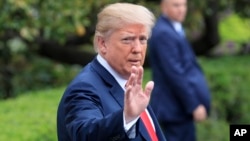President Donald Trump says he will announce Tuesday whether he will pull the United States out of the international nuclear deal with Iran and re-impose sanctions.
Trump has frequently complained the 2015 agreement to ease sanctions against Iran in exchange for curbs on its nuclear program is a "disaster."
He says it does nothing to stop Iran from testing ballistic missiles and says the deal lets certain nuclear-related provisions eventually expire.
But he has been under pressure from both sides, including European leaders who want the U.S. to stay in, and Israel, which accuses Iran of blatant lying and cheating.
French President Emanuel Macron was at the White House two weeks ago, saying he knows the deal with Iran is not perfect, but said there is no "Plan B."
British Foreign Secretary Boris Johnson was in Washington Monday, lobbying top Trump administration officials to stay in the pact. He met with Secretary of State Mike Pompeo and will talk later with Vice President Mike Pence and National Security Adviser John Bolton.
"At this delicate juncture, it would be a mistake to walk away from the nuclear agreement and remove the restraints that it places on Iran," Johnson wrote in The New York Times.
"Now that these handcuffs are in place, I see no possible advantage in casting them aside. Only Iran would gain from abandoning the restrictions on its nuclear program."
In a highly dramatic TV display last week, Israeli Prime Minister Benjamin Netanyahu brought out what he said were "half a ton" of documents, charts, blueprints, and photographs proving Iran is still trying to build nuclear bombs despite the agreement.
"Iran lies, big time," Netanyahu said.
Although international inspectors have certified Iran is abiding by the agreement, Trump said Netanyahu's display shows "I've been 100% right" about Iran's nuclear intentions.
Iran has insisted it has not violated the agreement and complains it has yet to see the economic benefits it was supposed to enjoy when sanctions were eased.
Tehran has always said it has no ambitions to build nuclear weapons but does have a right to a peaceful civilian nuclear program.
Also Monday, Trump accused former Secretary of State John Kerry of possible "illegal shadow diplomacy" following a Boston Globe newspaper report that he has been lobbying foreign governments on ways to keep the U.S. in the deal.
Kerry was lead negotiator for the Obama administration and "the one that created this mess in the first place." Trump tweeted.
The other signatories to the agreement are Britain, China, France, Germany, and Russia.











